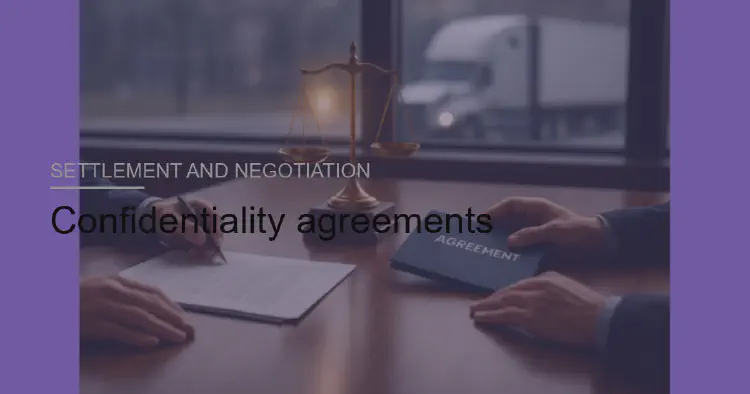Confidentiality agreements
Confidentiality agreements are often included in truck accident settlements to restrict disclosure of the settlement terms or case details. While they can benefit defendants, plaintiffs must carefully evaluate their impact before agreeing.
- Truck Accident Law Team
- 2 min read
Article 5 of 6 in Settlement and Negotiation/

Confidentiality Agreements in Truck Accident Settlements
What Are Confidentiality Agreements?
- Clauses in settlement contracts that prohibit parties from disclosing details of the settlement.
- May cover the settlement amount, terms, or even facts of the case.
Why Defendants Favor Them
- Protect company reputation by preventing negative publicity.
- Avoid encouraging other claimants to pursue similar lawsuits.
- Keep settlement amounts private to maintain negotiation leverage in future cases.
Potential Downsides for Plaintiffs
- May prevent victims from speaking publicly about their case or warning others about dangerous practices.
- Restricts sharing settlement details with the media or even extended family.
- Violations can trigger penalties or repayment obligations.
Common Terms
- Non-Disclosure of Settlement Amount: Prohibits discussing the payout figure.
- Non-Disparagement Clauses: Prevents parties from making negative statements about the trucking company.
- Exceptions: Typically allow disclosures to attorneys, tax advisors, or immediate family members.
Strategic Considerations
- Plaintiffs should weigh the value of confidentiality against their right to speak openly.
- Attorneys may negotiate additional compensation in exchange for agreeing to confidentiality.
- Courts may enforce or limit confidentiality depending on state law and public interest.
Legal Importance
- Once signed, confidentiality agreements are legally binding.
- Violating them can lead to lawsuits, financial penalties, or loss of settlement funds.
- Plaintiffs should fully understand restrictions before agreeing.
Summary: Confidentiality agreements in truck accident settlements protect defendants from publicity but may limit plaintiffs’ rights. Victims should carefully review these clauses with legal counsel and, if necessary, negotiate higher compensation in exchange for confidentiality.